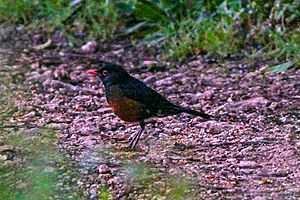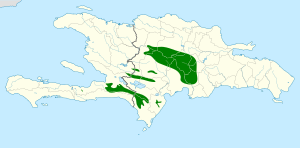La Selle thrush facts for kids
Quick facts for kids La Selle thrush |
|
|---|---|
 |
|
| Conservation status | |
| Scientific classification |
|
| Kingdom: | Animalia |
| Phylum: | Chordata |
| Class: | Aves |
| Order: | Passeriformes |
| Family: | Turdidae |
| Genus: | Turdus |
| Species: |
T. swalesi
|
| Binomial name | |
| Turdus swalesi (Wetmore, 1927)
|
|
 |
|
| Script error: The function "autoWithCaption" does not exist. | |
Script error: No such module "Check for conflicting parameters".
The La Selle thrush (scientific name: Turdus swalesi) is a special type of bird. It belongs to the Turdidae family, which includes many thrushes. This bird lives only on the Caribbean island of Hispaniola. This island is shared by two countries: the Dominican Republic and Haiti.
The La Selle thrush likes to hide in thick broadleaf and pine forests. It usually lives high up, around 1300 meters (about 4,265 feet) above sea level. Sadly, there aren't many of these birds left. Most of them live in the Dominican Republic, and a very small group is found in Haiti.
Contents
About the La Selle Thrush
Where Its Name Comes From
The La Selle thrush gets its name from Pic la Selle. This is the highest mountain in Haiti. So, its name tells us a bit about where it lives!
Where It Lives
The La Selle thrush is found only on the island of Hispaniola. Scientists have found two main groups, called subspecies, of this bird:
- T. s. dodae: This group lives in the mountain ranges of the Cordillera Central and Sierra de Neiba in the Dominican Republic. It also lives in the La Visite National Park in Haiti.
- T. s. swalesi: This group is found in the Sierra de Baoruco and the Massif de la Selle.
These birds prefer to live in moist, cool montane habitats. These are mountain areas with lots of trees and plants.
Why It Needs Our Help
The La Selle thrush is considered a vulnerable species. This means it is at risk of disappearing. The biggest threat to these birds is habitat loss. This happens when their forest homes are cut down or changed by human activities. Protecting their forests is very important to help these birds survive.
How It Behaves
Even though the La Selle thrush is usually shy, it sometimes gets brave! It might even come close to roads or other places where people are. These birds are most active and sing their songs at dusk (when the sun sets) and dawn (when the sun rises).
See also
 In Spanish: Zorzal de La Española para niños
In Spanish: Zorzal de La Española para niños
 | DeHart Hubbard |
 | Wilma Rudolph |
 | Jesse Owens |
 | Jackie Joyner-Kersee |
 | Major Taylor |


